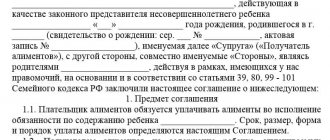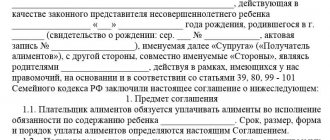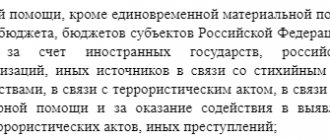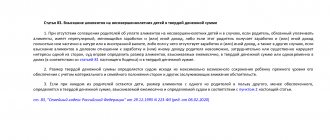When a child is born, each of his parents is assigned the same responsibilities for his upbringing and financial support. And having a father or mother living separately from a son or daughter does not relieve an adult of these responsibilities.
A parent living separately from his child must transfer part of his monthly income for food, clothing and other needs of the heir. Alimony can be collected not only from wages, but also from social benefits. Is alimony taken from a disability pension?
Legislation on alimony payments
The main law that regulates the procedure and amount of alimony payments is the Family Code of the Russian Federation, which in Art.
80-87, 89, 90 clearly defines how, in whose favor and by whom payments are made, including whether a disabled person must pay alimony. Among unscrupulous payers, there is an opinion that the presence of disability can serve as a basis for exemption from paying alimony. However, Decree of the Government of the Russian Federation No. 841 of 1996, without any alternative, interprets the disability pension as income from which payments must be made in favor of minors. Therefore, the question of whether disabled people pay child support has an unequivocally positive answer, although with some nuances of collection.
The legislator has established that the need and incapacity of a spouse, the inability to provide their own maintenance with their own funds are not grounds for being exempt from the obligation to pay alimony. Regardless of whether, for example, a spouse is a disabled person of group 1, 2 or 3, he is obliged to pay alimony payments for the maintenance of his minor child.
Due to the fact that often a payer with a 1st or 2nd disability group himself needs care and treatment, which requires significant expenses, the legislator has provided for the possibility of reducing payments for a child, and in critical situations - complete exemption from them in court.
In cases where a child needs long-term and expensive treatment, the size, on the contrary, can be increased. The regulatory documents provide an explanation of whether alimony is calculated from a disability pension in Russia, and also provide information on how their amount is calculated.
Concepts and terms used in laws
The social status “disabled” can be obtained as a result of a medical and social examination. After this, the citizen has grounds for:
- Recognition of his partial or complete incapacity and/or ability to work;
- Registration and assignment to one of the disability groups;
- Assignment of the prescribed amount of social benefits.
Disability groups are determined by the degree of injury or incapacity and include:
- Group 1 - with a persistent and pronounced violation of one or more important functions of the body, as a result of which the citizen is extremely limited in his capabilities and strictly needs the help and supervision of other persons.
- Group 2 - also observed and pronounced violations of important functions of the body, while the citizen can cope with them with the help of other persons, special devices and other aids.
- Group 3 - those with mild and moderate impairments of vital functions, which citizens can cope with on their own. As a result, there remains incomplete working capacity with the ability to work in a light mode using special tools.
Disability benefits are regulated by the legislation of the Russian Federation (Federal Law No. 166-FZ and No. 181-FZ), and are calculated individually for each group.
Citizens with disabilities can count on the following payments:
- Social or insurance pension.
- Monthly cash payment (MCV).
- Salary upon employment.
- Other income, including rent from the rental of real estate, income from business activities, participation in investment programs and business entities.
The first two points of income are provided for disabled people by law, while the others may be present if a particular citizen has labor and financial capabilities.
Should disabled people pay child support?
Upon divorce, the parent who does not live with the child is obliged to pay a share of their income until the child reaches adulthood. The question arises: is alimony deducted from a disability pension?
The legislation establishes that permanent or temporary disability does not exempt a citizen from paying mandatory contributions from any source of income, including disability pensions. In this case, alimony is collected on a general basis, with the exception of some nuances that affect the amount of the benefit. If a person with a disability finds the strength to work, but his own treatment also requires material costs, then money is withheld only from wages.
Required documents
Is alimony collected from a disability pension by default, without an application? No. Only the court can determine the payment by appropriate decision.
To apply for child support from a disability pension, you need to collect the following package of papers:
1. Statement of claim in triplicate.
2. Certificate of marriage or divorce.
3. Children's metrics (for all children for whom the payment is made).
4. If paternity of the children has been established, this document must also be attached.
5. Plaintiff's passport.
How to proceed when preparing a package of documents:
- Make copies of all papers (except for the statement of claim).
- Make an item-by-item inventory on a separate sheet.
- File the copies along with the inventory in the order in which they are listed (the statement of claim is not filed).
- Bring bound copies, three copies of applications, original documents to the office of the district court at the place of residence of the plaintiff or defendant.
- Make sure that the secretary puts the incoming document number on one of the copies of the claim (it remains with the plaintiff, one remains in court, the second is sent to the defendant by mail).
- Wait for the decision to hear the case.
In what cases are payments collected?
The Family Code of the Russian Federation clearly states whether alimony is taken from a disability pension, as well as in whose favor, by whom and in what amount payments should be made.
Money must be collected from citizens with disabilities if they have:
- children under the age of majority;
- an adult child with disabilities in need of treatment;
- wives in the stage of pregnancy, as well as a child who will be born in the future, until he reaches the age of 3 years;
- husband (wife) who cares for a common child and cannot work.
In addition to the monetary equivalent, mandatory financial assistance can be provided in the form of food or things necessary for the child.
This is practiced in the following cases:
- if there is a mutual agreement of the spouses on this;
- if the husband suspects his wife of misusing the collected money.
However, by a court decision, a disabled person may be released from the obligation to financially support his ex-spouse in the following cases:
- their marriage was short-lived;
- the disability was caused by criminal activity or drug or alcohol abuse;
- sometimes the reason may be the unworthy behavior of a husband or wife in the family.
Even using state benefits, the spouse has the right to demand that her husband pay money for the maintenance of the child or herself, having evidence of additional expenses.
Nuances
Citizens who become disabled and do not live with the child after a divorce are obliged to pay alimony according to the general rules established by family law. In the event that the payer has no real ability to pay the funds, the parties can enter into an agreement on offset. In this case, the disabled parent registers property in the name of the child, for example, donates a car, valuables, an apartment or something else. This is regarded as compensation for monthly alimony amounts, which means that after the property is registered, the obligation to pay is removed.
For your information
A disabled person who needs third-party support has the right to act as a plaintiff and recipient of alimony. It is noteworthy that this right is reserved to him only if the relationship between the spouses has been officially registered. Thus, cohabitants cannot count on mutual assistance.
Types of payments
The legislator provides for three types of disability pensions:
- State.
- Labor.
- Social.
State
To receive a state disability pension, a pensioner must meet certain conditions:
- Suffer from various kinds of man-made disasters.
- Be a participant and victim of a radiation disaster.
- Be a participant in the Great Patriotic War.
- Be a soldier.
Labor
To calculate a labor pension, a disabled person must have work experience.
At the same time, it is necessary that the employer also fulfills its obligations regarding labor legislation, that is, it must pay all necessary payments throughout the entire length of service.
Social
All disabled people of any group (first, second or third) have the right to receive a social pension.
At the same time, disabled people of the first two groups are not released from their alimony obligations, despite their state of health.
However, such citizens can count on some reduction in payments if they can prove such a need in court.
Are they holding on?
The current legislation of the Russian Federation provides that a disabled person of any group undertakes to pay alimony payments if necessary. If the debtor is employed and receives wages, deduction will be made from it.
Read also: Is it possible to work with 1 disability group: legal provisions and special conditions
Note! When the alimony payer receives a court order, he must contact the FSSP. After this, service employees will notify the Pension Fund about the withholding.
Is alimony paid, collected, and is it taken from the pension?
Alimony is withheld from almost all sources of income, with rare exceptions. And most types of pensions do not fall into these exceptions.
By disability
If a person is paid a disability pension, he is obliged to transfer part of the funds to the account of the alimony recipient under the same conditions as in a normal situation.
This type of pension consists of:
- The insurance portion, the amount of which is calculated based on salary and length of service.
- Basic accrual, which depends on the disability group.
It is logical that a capable disabled person who can earn money will pay more. It should be noted that alimony in such a situation is withdrawn not only from the pension, but also from other sources of income. For example, from wages.
Serviceman
A serviceman's pension is usually quite substantial. Moreover, if you retire based on length of service, even though a person starts serving at an early age, he will still be able to work and at the same time, will receive good money from the state. A portion of all such income is deducted, which will be used to pay alimony.
A serviceman's pension may consist of:
- Pension contributions.
- One-time assistance.
- Allowances.
- Compensation.
Pensioner of the Ministry of Internal Affairs
In terms of receiving a pension, employees of the Ministry of Internal Affairs are almost identical to military personnel. The differences in this case are so minor that they do not in any way affect how alimony is collected. The deduction rules and general principles are identical for almost all situations, including this one.
By old age
Even if the alimony payer receives a pension due to the fact that he has reached old age, this is still not a reason for non-payment of alimony. Funds are taken from the total pension amount and transferred to the recipient’s account on a general basis, just as they are withheld from official wages.
For the loss of a breadwinner
But they no longer take alimony from this pension. This rule is enshrined in PP No. 841. It is believed that such payments are already a kind of variation of alimony paid by the state and it is impossible to charge additional amounts for child support.
This category also includes any other pensions that come from the regional or federal budgets, but in each individual case the court makes a separate decision, considering all the features of the case.
Who has the right
Any potential recipient has the right to receive alimony from a payer receiving income in the form of a disability pension in accordance with the norms of the Family Code.
Most often, in this case, alimony from a pension in case of disability is recovered from minor children or children who are disabled.
At the same time, the fact of deprivation of parental rights will not be the reason for the cancellation of alimony. They will also have to bear the corresponding responsibility.
Amount of alimony per disabled person by group
The amount of the pension depends on its type:
- insurance is assigned to the persons who transferred the contributions;
- Social security is considered disabled regardless of length of work experience.
Group 1 disability
The insurance pension is calculated by multiplying the number of accumulated IPC by the cost of one coefficient on the date of appointment.
Calculation example:
IPC – 80, price of 1 point – 81.96 rubles.
80 x 81.96 = 6,556 rubles. Additionally, disabled people of group 1 are given a fixed payment of RUB 9,965.80.
6,556 + 9,965.8 = 16,521.80 rubles. – the total amount of the benefit.
For one child the following will be kept:
16,521.8 x 25% = 4,130.45 rubles.
For two children:
16,521.8 x 33% = 5,452.20 rubles.
For three or more:
16,521.8 x 50% = 8,260.90 rub.
The social pension for disabled people of group 1 is 10,068.53 rubles, no additional payments are due.
Disability 2 groups
The procedure for calculating the insurance pension for group 2 disability remains the same as for the first. The amount of the surcharge is changing downward - 4,982.90 rubles.
Calculation example:
IPC on the account is 120, the price of one point is 81.96 rubles.
120 x 81.96 = 9,835.2 – base part.
9,835.2 + 4,982.90 = 14,818.1 rub. - total. The amount is used to calculate alimony payments.
Social benefit is 10,068.53 rubles.
Disability 3 groups
When receiving the third group, citizens most often continue to work, so alimony will be withheld from both incomes. The insurance pension depends on the number and cost of the IPC; there is also a fixed part - 2,491.45 rubles.
If the payer does not have insurance experience, only 4,279.14 rubles are transferred. monthly in the form of benefits.
Example of calculation from an insurance pension:
Martynov O.L. received disability of the third group. During his work, his account accumulated 100 IPK. On the date of granting the benefit, the cost of one coefficient was 81.96 rubles. Child support is paid for one child.
100 x 81.96 = 8,196 – base part.
8,196 + 2,491.45 = 10,687.45 rubles. – total benefit amount.
10,687.45 x 25% = 2,671.87 rubles. – amount of payments per child.
Example of calculation from social pension:
Ananenko L.N. never worked. There are two children for whom child support is paid. The pension amount is 4,279.14 rubles.
4,279.14 x 33% = 1,412.12 rubles. - amount of alimony.
The ex-spouse cannot apply for an increase in alimony payments, since the payer is disabled and himself needs financial support, and he has no other sources of income other than a pension. The absence of an established disability is not a basis for increasing the amount of alimony.
If the payer works unofficially and receives disability benefits, the recipient will have to prove the fact of receiving “black” wages. This will require the involvement of inspectors from the Federal Tax Service to conduct an inspection.
Amount of alimony
The amount in which alimony is withdrawn from a pension depends on many factors, but primarily on the number of children.
For one child
You are required to deduct 25% of your income for the maintenance of one child. In our case, from a pension, no matter what size it reaches.
For two children
For two children, the deduction will be slightly larger, but not 50%, which would be logical, but approximately 33% (one third) of all income received. For pensioners, an important feature is precisely the fact that the deduction does not occur in the form of a fixed amount, but rather as a percentage.
For three children or more
You will have to transfer 50% of your pension to support three children. The interesting thing is that having more kids doesn't make any difference. That is, the same 50% will have to be deducted for both 4 and 10 children.
If children are from different marriages
The law makes no difference between children from different marriages and from the same marriage. Contributions are made in the same amount, and the only difference is that the recipients of the funds will be different.
Sometimes the amount of alimony is determined incorrectly when there are two children from different marriages. Each recipient claims 25% of the pension, which in total is already 50%, not 33%. If the amount of the payment seems too high, you need to contact the bailiffs and demand a recalculation.
Maximum payment percentage
The maximum payment amount cannot exceed 50% of the pension. The only exceptions are situations involving the formation of debt. If the payer is late, up to 70% can be written off from his pension, a significant part of which will be used to pay off the debt. As soon as the debt disappears, the payment amount will return to the previous level.
Pensions from different sources
As in the case of children, the law does not distinguish between pensions from different sources. This simply means that the payer will pay more.
Example: If the payer has two children, and he receives 10 thousand pensions for length of service and 5 thousand for disability, then he will deduct 33% from both 10 thousand and 5 thousand at the same time. The amount of alimony in this situation will be 4950 rubles.
An exception is made only for those types of pensions from which alimony is not deducted.
Example: If we consider the previous situation, but instead of a disability pension indicate a survivor's pension, then in this case alimony will be deducted only from 10 thousand rubles, since 5 thousand of the survivor's pension will not be taken into account.
Correction factors
Since many pensioners already receive very small payments from the state, the court decides on the amount of payments in each case on an individual basis. Absolutely everything is taken into account, from the cost of living to the cost of travel or medicine. As a result, the payment amount is often extremely small.
Lawyer's answers to private questions
Can money be withdrawn from the EDV pension for alimony?
Yes, all bonuses and additional payments to the pension in accordance with Government Decree No. 841 are subject to consideration when calculating alimony.
Is alimony collected from the funded part of the pension?
No. The funded part is formed from the salary from which alimony is already withheld. In addition, payments are not included in the list established by PP No. 841.
Is it possible to collect alimony from a pensioner in a fixed amount?
Yes, if the amount of payments in shares violates the interests of the child and does not meet his needs. When making a decision, the court takes into account the financial situation of the plaintiff and defendant.
What is the maximum percentage of alimony collection from a pensioner?
and three children are retained 50%. If there are debts, the amount of deductions can be increased to 70% (Article 99 of the Federal Law of October 2, 2007 No. 229-FZ “On Enforcement Proceedings”).
Is it possible to apply for alimony to a pensioner if his adult son is also retired?
Yes. A retired parent can recover money for their own maintenance from a retired adult child. In this case, the court will take into account the general situation and financial situation of each party.
Reducing the amount of alimony for a disabled person
The amount that is calculated as alimony from a disability pension can also be reduced by court decision. A person with disabilities will transfer less to children if:
1. His illness worsened, due to which he was assigned disability, or another serious pathology began to develop, due to which his income decreased significantly (expenses for medicines increased, for example).
2. A minor who was entitled to money from a father or mother who did not live with him began to receive his own substantial income and now does not need serious financial assistance.
3. The alimony worker created a new family, in which children were also born.
4. The person has other obligations for similar payments for the maintenance of children or adults declared incompetent.
5. The spouse who lives with the minor recipient of alimony receives support from the state.
Percentage of deductions
The same percentage is withheld from the social pension as from other income:
- for one child – a quarter of the amount (25%);
- for two – a third of the amount (33%);
- three or more children must receive 50% of the father's or mother's pension.
There are exceptions to this rule. The court may order an amount equal to 70% of the pension of the parent living separately from the minor. The reason for this is a serious illness of the child, for the treatment of which a lot of money is spent, or the difficult general financial situation of the family in which the recipients of alimony payments are being raised.
Collection procedure
The collection procedure differs depending on the voluntary or forced payment of alimony. The presence of a disability pension is not a special factor, since this source of income is included in the list of amounts subject to alimony.
Payments on a voluntary and compulsory basis have different conditions and procedures. The decision to collect alimony in court will take into account all the income of the disabled person.
Payments on a voluntary basis
If there are agreements between the two parties, an alimony agreement is concluded. The document must contain the following conditions:
- financial support in the established amount and the procedure for its implementation;
- a list of reasons that terminate the contract;
- additional payments;
- reporting and intended use.
The form of the agreement is established by law and has a written version, which is certified by a notary in the presence of all interested parties.
If any clauses of the agreement are not fulfilled, the other party submits documents for enforcement.
Payments in court
If forced collection is necessary, a claim is filed in court, which can be district or city. This process is carried out at the place of residence and is accompanied by the collection of documents, including a marriage certificate and a child’s birth certificate. In general, the case of withholding the established amount in percentage or fixed terms is considered.
The decision is made on the basis of all documented factors. If there are additional disputes, they are also resolved in a general manner. Additional points are considered:
- divorce;
- establishing paternity;
- property division;
- additional claims, for example, for maintenance of the child’s mother.
Issues related to providing alimony for a minor are resolved immediately, since otherwise there will be a delay in deductions.
How to collect alimony from a pensioner
The procedure for collecting child support from a pensioner is no different from the standard procedure for collecting funds from any other parent. In particular, extrajudicial and judicial procedures are provided.
Procedure
An out-of-court procedure involves concluding an agreement on the payment of alimony between the child’s parents. This procedure for paying child support is good because the parties can determine for themselves how much the parent will pay. In addition, you can stipulate terms and payment periods. For example, you can transfer funds every month, every two months or quarterly. If the parent’s income allows, then the amount of payments may not be limited (the law does not prohibit transferring large amounts).
The agreement is completed by a notary and, if not fulfilled, may be presented to the bailiffs instead of a writ of execution.
The court procedure is relevant if the parent does not voluntarily provide financial support to the child.
The parent with whom the child lives can sue and forcefully recover funds:
- As a percentage of all income;
- In a fixed amount of money.
Most often, the courts make positive decisions in favor of the plaintiffs. The defendant will be required to contribute funds whether he wants to or not. Control over the execution of a court decision on the collection of alimony is carried out by the bailiff service. A monthly amount determined by the court will be withheld from the person’s income.
In addition, if a pensioner evades payment of alimony, a number of penalties are applied to him:
- A penalty for alimony is assessed;
- He may be held liable for malicious evasion and non-payment.
Statement
If you cannot reach an agreement with the defaulting parent, you can force him to pay funds for the child by filing a claim in court. The applicant can apply either to the court at the place of residence of the defendant or to the court at his place of residence - at his choice.
The claim is sent in two copies: one for the court, the second for the defendant. The statement describes in detail the circumstances of the case:
- Name of the court and address of the court;
- Name of the parties to the case, their full names, residence and registration addresses;
- Circumstances of the dispute: number of children, when the children were born;
- An indication of the moment from which the parent stopped helping financially;
- Justification for the amount of alimony;
- Request to the court to collect alimony;
- Date, list of attached documents and personal signature of the plaintiff.
Each circumstance must be documented.
Alimony can also be collected from a pensioner under a simplified procedure, but only if the pension is his only source of income. If there is a question about confirming other cash receipts or about establishing alimony in a fixed amount, then a statement of claim will need to be filed.
You can file a claim either independently, by appearing in court or sending it by mail, or you can entrust the handling of the case for collecting alimony to your representative.
Within 5 days, the judge will decide whether to accept the claim or notify about the presence of deficiencies and offer to eliminate them within the time limit set by him.
Note: Since 2021, it is possible to electronically file claims in courts of general jurisdiction (except for magistrates), however, this will require an electronic digital signature and registration on the State Services portal. Lawyers note that there is still a high percentage of so-called technical refusals in relation to documents submitted through the Unified Automated Identification and Authorization to the courts.
The sample below can be used to file a claim yourself, but it is better to consult with a lawyer first.
Documentation
The statement of claim must be accompanied by documents confirming the claims made in the claim. It can be:
- A copy of the statement of claim to the defendant;
- Marriage certificate;
- Children's birth certificate;
- Certificate from the place of residence of the children;
- Certificates of income of the parent who is raising the children.
All documents, except certificates, are submitted in copies. The originals must be brought with you to the court hearing in case the information contained in them is clarified.
In addition, you must attach a copy of the plaintiff’s passport, and if he is represented by a proxy, a copy of his passport and the original power of attorney. For more information on the composition of documents for collecting alimony, see here.
Appointment of alimony through the court
If the parties still cannot reach an amicable agreement or one of them violates the terms of the peace agreement, they will have to turn to the court, or rather, to the magistrates. The peculiarity of such cases is that they are considered by order, without holding full-fledged court hearings. Having considered all the materials of the case, the judge will issue a court order, which will indicate information about the amount, procedure and timing of payment of alimony, which should be calculated from the defendant.
IMPORTANT! In order for your statement of claim to be immediately accepted for consideration, try to draw it up correctly and attach all documents to the case materials. You can find a sample form for filing a claim in any department of justices of the peace at your place of residence.
In response to a claim for alimony, the defendant may submit a response request for alimony from his ex-wife for his maintenance. This is possible in the case where the disability was registered before the divorce or no later than a year after it. In this situation, the judge may refuse to satisfy the plaintiff’s claims if it turns out that the disability occurred due to:
- immoral behavior;
- alcohol or drug abuse;
- committing an intentional offense.
Reasons for reducing payments
There are reasons to reduce the payment, but they may not allow this procedure to be carried out. All new factors will be considered in court based on new data obtained. The person who pays alimony provides the necessary information and documents confirming the existence of the grounds:
- disability of the first or second degree;
- the need to make large expenses on medicines or care for the alimony payer;
- other children who need financial assistance;
- decrease in income, confirmed by certificates;
- improvement of the financial situation of the second parent;
- the minor is in the care of the state.
They appeal to the same court that set the initial alimony rate.
If there is an agreement between the parties, the contract is drawn up again and certified. If the other party does not agree, then an appeal to the court will be required.
The parent who pays alimony from a pension can also apply to the court for alimony support from the other spouse. But this will require going to court within a year after the divorce, and the duration of the marriage itself will exceed 5 years.
Required documents
If a voluntary agreement was concluded between the parties, the reduction in the amount or complete termination of the lien will be carried out on the basis of a claim brought by the debtor.
Since we are talking about reducing the amount or stopping payments, the initiator of the lawsuit will be the debtor. To do this, you need to submit the following documents to the court:
- a statement of claim that will contain the grounds for reducing the amount of transfers;
- the document on the basis of which the obligation is established;
- written evidence of changes in the marital and financial status of the parties.
Grounds for going to court
You can go to court on the following grounds:
- If alimony was withheld from a group 2 disabled person, the debtor retained limited ability to work and could receive additional income;
- If group 1 was confirmed during the next MSEC examination, the debtor loses the opportunity to carry out labor activities. In this case, there is a significant change in financial situation, which the court will take into account when considering the claim;
- Significant increase in the level of income of the claimant:
- finding a new job with a big salary;
- creating a new family with an increase in overall income.
In this case, the real need of the minor child to receive additional funds for maintenance from the father’s pension will be determined.
Procedure
- Determine the list of requirements for a potential payer.
- Make a statement.
- Submit an application to the court.
- Get a court order.
- Send the order to the bailiffs and/or to the pension fund.
Documentation
The following documents should be attached to the application for a court order:
- Applicant's passport.
- Passport of the potential payer (if any).
- Birth certificate of the child/children for whose maintenance alimony is required.
- Certificate of income/pension of the potential payer (if any).
- Certificates of marriage and divorce (if any).
Expenses
Unlike most such applications, if the case concerns only alimony, no state duty is charged.
Deadlines
Here the situation is identical to the option with an agreement, with one exception: if you need to receive payments for the previous term, you need to prove that the person did not go to court for a good reason: serious illness, negotiations on concluding an agreement, and so on. There can be many options.
What affects the size
The legislation provides rules that oblige the alimony payer to pay children fixed shares of their income.
Payments to disabled children
The number of children is taken into account, and the defendants pay:
- 25% – for one child.
- 30% – for two children.
- 50% – for three or more children.
The same amount of alimony is paid from the disabled person's pension and from any type of pension benefit, but the total amount of payments should not exceed half of his income.
In exceptional cases, taking into account all the nuances of a given family, the court may decide to recover up to 70% of the funds received by the payer in favor of the child
However, it should be taken into account that a person who has received a disability of the first group by law, being completely incapacitated, may also need additional care. When assigning alimony to a group 1 disabled person, the courts must record this, and penalties may be imposed in a smaller amount.
Alimony for a group 2 disabled person is paid in accordance with the law, but his incapacity and the need for additional expenses for his own treatment are taken into account. This may also be grounds for reducing the disabled defendant's benefits.
Having a third disability group, the defendant can engage in work and have additional income. In this case, alimony for a working group 3 disabled person is calculated from all types of income. If the defendant does not agree with this, the claim will recover funds from only one type of income.
The main factors contributing to a reduction in the amount of alimony:
- transfer of the recipient to state support. In this case, it is possible to completely exempt a defendant recognized as incapacitated from mandatory payments;
- the emergence of an inheritance from the recipient, improvement of his well-being;
- if a working father’s income has increased significantly and mandatory interest payments to children significantly exceed their needs.
Attention! If you have a reason to reduce the amount of deductions, you should file a claim with the courts at your place of residence, providing documents confirming this.
From which pensions payments are not withheld?
The legislation of the Russian Federation establishes that bailiffs cannot recover alimony payments from a pension for the loss of the sole breadwinner. This is due to the fact that its payment is carried out from the federal budget. A disabled citizen of any age category who has lost a breadwinner can receive such a pension.
There are other types of payments from which no one has the right to withhold the amount intended for the maintenance of a minor. This includes:
- One-time benefit.
- Any type of compensation and financial assistance.
- Funeral benefit paid when a family member dies.
- Benefit for a newborn child.
Main conditions
How much should I pay? As for the maximum deduction from a pension, it is exactly half of the amount. But the established amount of the penalty can be appealed. This becomes possible if the debtor must pay for his own treatment.
In practice, there are situations when the court increases the established maximum value to 70%. This applies to cases where the child has a serious illness.
Important! If a parent is a persistent defaulter, the legislation of the Russian Federation provides for liability:
- seizure of movable or immovable property,
- compulsory work,
- imprisonment for up to three months.
Is it possible to reduce the amount of alimony for a disabled person?
The amount of money paid can be reduced only if there are grounds. In this case, a person must collect the necessary package of documents and file a claim in court.
Required documents
If both parents agree to reduce the amount of alimony payments, the debtor must apply to the court with a corresponding statement of claim. In addition, you must submit the following package of papers:
- a document on the basis of which the parent is obliged to make child support payments;
- if the income of the parties has changed, documents are required to prove this fact.
Grounds for going to court
There are several grounds that allow the alimony payer to go to court to reduce payments:
- the child support payer was forced to make payments for the support of another child or adult;
- children were born in the new family of the alimony payer;
- the child for whom alimony is intended has begun to earn enough;
- the parent living with the child receives financial assistance from the state;
- The alimony payer’s illness has worsened or another serious pathology has appeared, due to which the amount of income has become several times less.
When the court examines all the circumstances described, it will make one of three decisions:
- reduce the amount of payments;
- completely exempt the applicant from payments;
- refuse the applicant.
Basic Concepts
Before studying a topic, you need to become familiar with the basic concepts.
What it is
Alimony is funds provided by a relative to a temporarily or permanently disabled citizen.
If a married couple divorces, the parent who does not live together with the minor must make monetary payments, which are commonly called alimony. Mandatory payments are repaid until the child reaches adulthood.
The legislation of the Russian Federation states that a citizen must make alimony payments even if he is disabled. This is due to the fact that any source of income is taken into account. If a parent receives benefits and works at the same time, but needs to pay for his own treatment, alimony is withheld exclusively from wages.
Types of alimony
Child support can be a fixed amount that the parent agrees to pay within a specified period or a percentage of total income.
The following persons can act as alimony payers:
- father of a minor,
- child's mother,
- both parents.
Conditions of receipt
A disabled person of any group undertakes to make alimony payments in the following cases:
- if there is a child with whom he does not live,
- if you have a pregnant wife,
- if necessary, provide support for the spouse who is caring for their shared disabled child.
Grounds for termination
In some cases, alimony payments are terminated. This point is spelled out in the RF IC. Termination of pension payments occurs on a general basis:
- the age of majority of the alimony recipient;
- official employment of the child;
- the payer is declared incompetent;
- adoption of a child by a new parent;
- obtaining legal capacity by a child.
If a child is studying at a higher educational institution, child support will have to be paid until he reaches 23 years of age. In the standard case, until adulthood. When a disabled person receives a pension, in these cases, alimony payments will not be stopped until a reason arises.
Responsibility for non-payment of alimony
Responsibility for non-payment of alimony is expressed in varying degrees. This degree depends on whether the defaulter is at fault. Types of responsibility:
- civil in case of delays in the form of additional penalties;
- administrative leads to blocking of funds and accounts;
- evasion of payment leads to forced public works;
- in case of malicious evasion, the term of detention in places of imprisonment reaches 1 year.
The degree of guilt is determined by the court, so it is required to provide all data on the fact of evasion of alimony.









